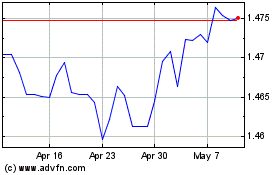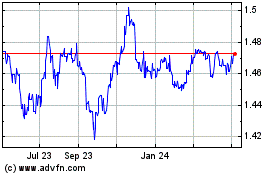Euro Falls Amid Risk Aversion
August 30 2018 - 1:32AM
RTTF2
The euro declined against its major counterparts in the European
session on Thursday amid risk aversion, as renewed concerns that
China's growth is slowing and Brexit fears overshadowed signs of
progress in NAFTA talks.
U.S. tariffs on another $200 billion of Chinese goods will take
effect next month and the response from China may have significant
consequences for the global economy and currencies.
Meanwhile, Italian Deputy Prime Minister Luigi Di Maio denied
media reports suggesting that Italy is considering a plan for a new
bond-buying program from the European Central Bank to avert a
ratings downgrade.
Survey results from European Commission showed that Eurozone
economic confidence deteriorated more-than-expected in August.
The economic sentiment index dropped to 111.6 in August from
112.1 in July. The expected score was 111.9.
The currency traded mixed against its major counterparts in the
Asian session. While it held steady against the pound and the
franc, it fell against the greenback and the yen.
The euro retreated to 1.1675 against the greenback, from a 2-day
high of 1.1718 hit at 3:15 am ET. The euro is likely to challenge
support around the 1.15 level.
The single currency edged down to 130.26 against the yen, after
having advanced to 130.87 at 8:00 pm ET. On the downside, 128.00 is
likely seen as the next support level for the euro.
Data from the Ministry of Economy, Trade and Industry showed
that Japan retail sales rose a seasonally adjusted 0.1 percent on
month in July.
That missed expectations for an increase of 0.2 percent
following the 1.5 percent spike in June.
The euro fell to 1.1323 against the franc, its lowest since
August 16. The euro is poised to find support around the 1.12
level.
The euro eased to 1.5098 against the loonie and 1.6027 against
the aussie, from its early high of 1.5129 and more than 4-month
high of 1.6083 respectively. If the euro falls further, it may find
support around 1.49 against the loonie and 1.57 against the
aussie.
On the flip side, the euro bounced off to 0.8993 against the
pound, from a weekly low of 0.8972 seen at 2:15 am ET. If the euro
rises further, 0.92 is likely seen as its next resistance
level.
Data from the Bank of England showed that UK mortgage approvals
decreased more than expected in July.
The number of loans approved in July fell to 64,768 from 65,374
in June. Approvals were forecast to fall moderately to 65,000.
Looking ahead, at 8:00 am ET, German preliminary CPI for August
is scheduled for release.
In the New York session, Canada GDP data for June, U.S. weekly
jobless claims for the week ended August 25 and personal income and
spending data for July are set for release.
Euro vs CAD (FX:EURCAD)
Forex Chart
From Mar 2024 to Apr 2024

Euro vs CAD (FX:EURCAD)
Forex Chart
From Apr 2023 to Apr 2024
